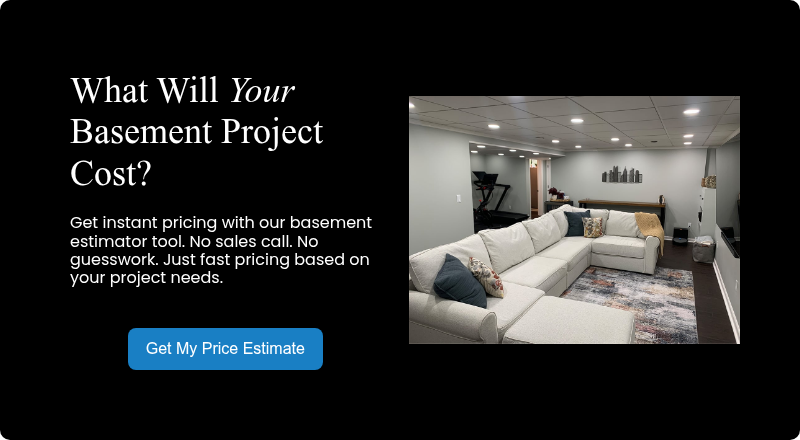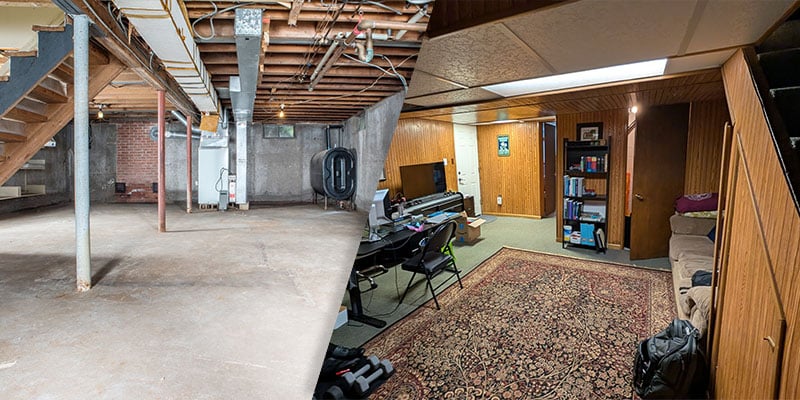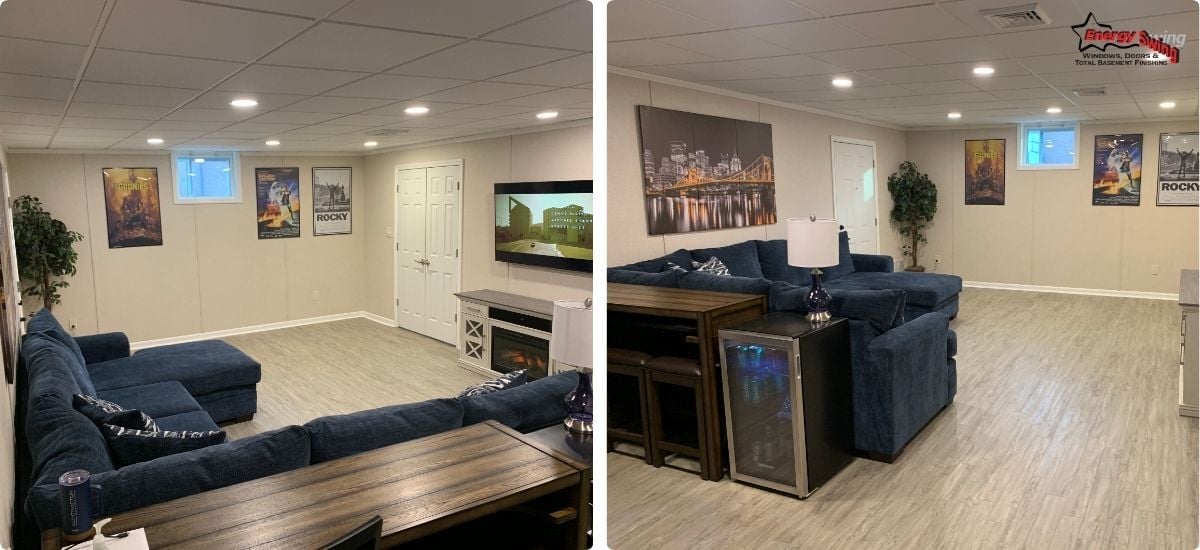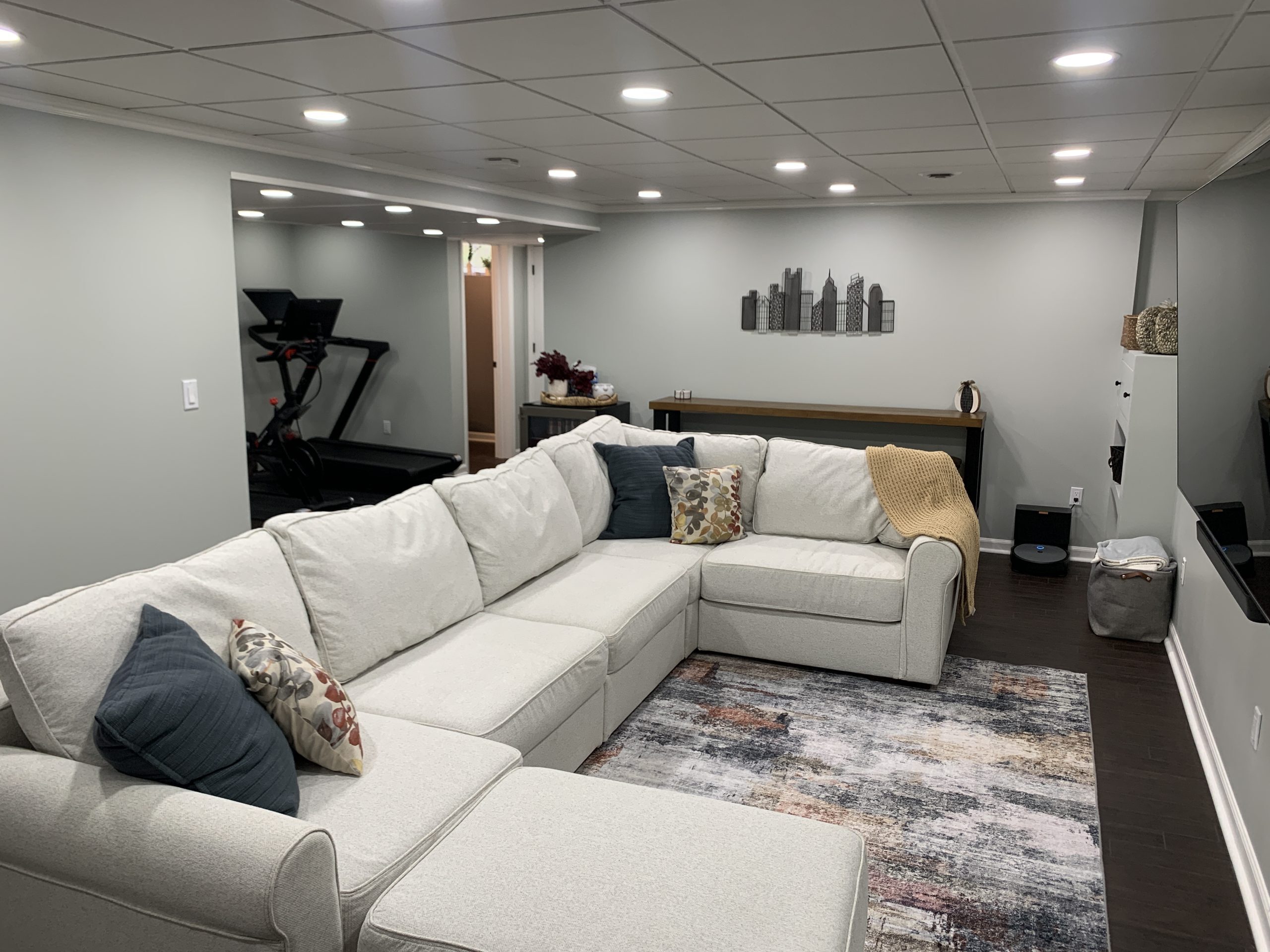
What Should Be Included in a Basement Finishing Estimate (Besides the Final Price)?
Every basement is unique, even if homes on your street were all built by the same builder. Ceiling heights, plumbing lines, stairs, water concerns, and even small details like nail placement in older wood all affect cost.
When you receive an estimate that’s just a number with no detail, it’s time to ask questions. You could be stepping into a project filled with:
- Hidden upgrades you didn’t plan for
- Scope changes that inflate your cost
- Timeline extensions that throw off your schedule
Consider this: the average finished basement costs between $30,000–$70,000 in Pittsburgh, depending on size, design, and code requirements. A contractor quoting $20,000 over the phone without seeing your basement isn’t doing you a favor; they’re setting you up for costly surprises.
A real estimate by a knowledgeable and experienced professional gives you clarity, leverage, and accountability, not just a guess on paper.
The 9 Things Every Pittsburgh Basement Finishing Estimate Should Include

1. Site Visit and Scope Assessment
Your protection from hidden costs starts with the site visit. An in-person walkthrough ensures your contractor truly understands your space and can identify potential issues before they become expensive surprises.
Your contractor should…
- Take precise measurements for the space you need
- Inspect for moisture or water intrusion (including humidity or vapor, not just leaks)
- Check for structural issues, like stair rot in older homes
- Ask how you plan to use the space—home office, bar, gym, or media room
Skipping a thorough assessment often leads to bad assumptions. For example, a hidden gas line or low-hanging ductwork can force ceiling adjustments that add thousands of dollars to your project.
2. Detailed Technical Drawing
This is where your vision becomes real… and correctable. Technical drawings give you a clear visual of the finished space, so you can catch misunderstandings and make layout changes early when it’s still affordable to do so.
A 3D floorplan would be a plus, but at the very least, your estimate should include diagrams or CAD drawings that clearly show:
- Which areas are finished vs. unfinished
- Bathroom layouts with real dimensions (to prevent undersized, impractical spaces)
- Placement of walls, flooring, and doors

These drawings are your safeguard that confirms that your contractor understood your vision and gives you the chance to make changes before construction begins.
Pro Tip for Pittsburgh Homeowners: In neighborhoods with tight rowhomes like Lawrenceville or Bloomfield, basements often have narrow layouts and odd corners. Having drawings helps you visualize how to use every inch of space efficiently, especially if ceiling heights are low.
3. Scope of Work and Materials List
No guesswork, no bait-and-switch. A detailed scope and materials list protects you from budget creep and makes sure the finishes, fixtures, and features match what you expect before work even begins.
- Number of outlets and lights
- Flooring type and square footage
- Trim, drywall, and ceiling details
- Whether windows or stairs are being updated
This is your proof of what you’re actually getting. Don’t rely on verbal agreements; your scope and materials list should leave no room for doubt. If it’s not listed, it likely isn’t happening. Without a materials list, you could end up with bargain-basement finishes when you were expecting higher quality.
If you're finishing a Mt. Lebanon or Squirrel Hill home with older windows or stairs, make sure it's crystal clear whether those are part of the project. You shouldn’t be left guessing or footing the bill for upgrades you thought were included.
Once materials are clarified, your next concern should be timing.
4. Timeline with Milestones
Know what’s happening and when. A milestone-based timeline gives you visibility into the project and confidence in its progress, so you're not left wondering why no one showed up for three days.
Beware of vague promises like “4–6 weeks.” A professional contractor will provide a sequence of benchmarks tied to a realistic payment schedule, such as:
- Framing complete by Week 2
- Plumbing and electrical inspections scheduled by Week 3
- Drywall and painting by Week 5
Keep in mind: if you add work mid-project (like upgrading to a wet bar or adding built-ins), timelines will shift. Still, you deserve a realistic ballpark. If someone promises a fully finished basement in under a month, be cautious; quality takes time.
Want to see what a complete estimate looks like? Schedule your consultation to see how we handle each of these steps.
5. Payment Schedule
Protect your budget every step of the way. A fair, staged payment schedule helps you avoid financial risk while keeping your contractor accountable to the timeline and quality milestones. A stable, established contractor won’t demand 50% or more upfront.
Instead, look for a staged plan like:
- 10–20% deposit at signing
- Payment at project start
- Progress payments tied to milestones
- Final balance due at substantial completion

This payment structure keeps you in control throughout the project. You maintain financial leverage while ensuring your contractor has what they need to keep the work moving.
6. Contingencies and Exclusions
Reading the fine print now protects your wallet later. If you don’t know what’s not included in your estimate, you’re likely to face surprise add-ons when unexpected issues arise mid-project.
In Pittsburgh, many older basements were never finished before, which lowers the odds of hidden mold, but if your home already had a “DIY” finish in the past, you might expect some surprises.
Some basements require demolition work before construction can begin. Make sure this work is included in your estimate (including the disposal of debris) and also the clean-up and removal of unused materials.


7. Permits and Code Requirements
Stay legal and protect your home’s resale value. Permits and inspections aren’t just paperwork. A solid estimate should spell out who handles them, so you avoid delays, code violations, or future headaches when you sell.
The City of Pittsburgh has stricter permit rules than many suburbs. In Allegheny County and the City of Pittsburgh, permits are almost always required for plumbing, electrical, and framing. In parts of Westmoreland, Washington County, and more rural counties, rules may be looser.
When you go to sell, inspectors may require you to tear out and redo non-compliant work. Your estimate should clearly state:
- Who is responsible for obtaining permits
- Whether inspection costs are included
- How scheduling inspections may affect your project timeline
Ask how your contractor handles this before signing. You can review the official residential basement permit requirements to see what applies in your neighborhood.
8. Second Site Visit to Confirm Details
This is your last chance to lock in the details. Don’t skip it!
A second site visit ensures your project manager, not just the salesperson, fully understands the layout and expectations before any demo begins. It’s how you avoid “I thought we agreed...” moments later.
At this stage, you should review:
- Outlet, light, and switch placement
- Final layout details with scaled drawings
- Any last-minute concerns before demo starts
Homes in neighborhoods like Ross Township or Bethel Park often have finished and unfinished “split” basements. A second site visit ensures your contractor knows exactly which areas you want finished and prevents miscommunication.
Use this second visit to also meet the people who will be doing the work. The installers doing the work will be in your home for an extended period of time. Make sure to choose a company that requires background checks for your and your home's safety and peace of mind.
9. Clear Warranty Terms That Cover More Than Just Materials
Don’t just hope the work holds up; make sure it’s guaranteed. A strong warranty gives you peace of mind long after the project ends, especially in water-prone Pittsburgh basements.
Not all warranties are created equal. Many cover only materials (for example, if drywall is defective), but not the actual installation work, and very few cover water damage.
Look for a contractor who offers:
- Workmanship warranties in writing
- Clear explanations of what’s covered (and what isn’t)
- System-specific guarantees for basement environments
Pittsburgh’s heavy rainfall, high humidity, and clay-rich soil can make basements especially prone to water intrusion. A basement warranty is more than a nice-to-have, it’s an essential to having peace of mind.
Make sure you ask directly: “What does your warranty actually cover?” If it only protects materials, that won’t help you if something is installed incorrectly or if water damage becomes an issue months later.

What’s Missing? Red Flags in Incomplete Estimates
If your estimate is missing any of these nine elements, stop and ask yourself: “What’s being left out and why?”
Red flags to watch for include:
- Vague language like “miscellaneous” line items or “as needed” in estimates
- Contractors who can “start tomorrow” (usually a sign of inexperience or desperation)
- Prices under $30,000 for a full basement finish. This is almost always unrealistic with today’s labor and material costs
- Lack of a PA contractor registration number, liability, and workers’ compensation insurance, or a physical business location
Ask directly: Will you be working with in-house employees, or will subcontractors be coming into your home? That difference matters when it comes to communication and accountability.
How a Complete Estimate Protects You and Your Budget
A detailed estimate gives you control over your project. It prevents scope creep, keeps payments clear, and ensures expectations are met. You’ll have leverage if something doesn’t go as planned, and peace of mind from start to finish.
- Prevents the scope of work from creeping up and surprise bills
- Reduces payment dispute
- Keeps the timeline clear with built-in milestones
- Provides leverage if expectations aren’t met
In short, it sets the stage for a smoother project and protects your investment from day one.
What Is the Next Step to Finish Your Basement for Pittsburgh Homeowners?
In the past, too many Pittsburgh homeowners have trusted basement estimates that were vague, rushed, or missing key details and paid the price with blown budgets, change orders, and unfinished spaces.
Now you know what a complete, transparent estimate should look like. From second site visits and CAD drawings to contingency planning and clear warranty terms, these nine components are what separate a reliable quote from a risky one.
Next? Let us show you how it should be done.
Click below to schedule a consultation with our team. We’ll walk you through each of these elements in detail (no pressure, no surprises) so you can move forward with total confidence.
Topics:







.jpg?width=1200&height=550&name=Copy%20of%20Copy%20of%20ESW%20Collage%20Template%20(3).jpg)




